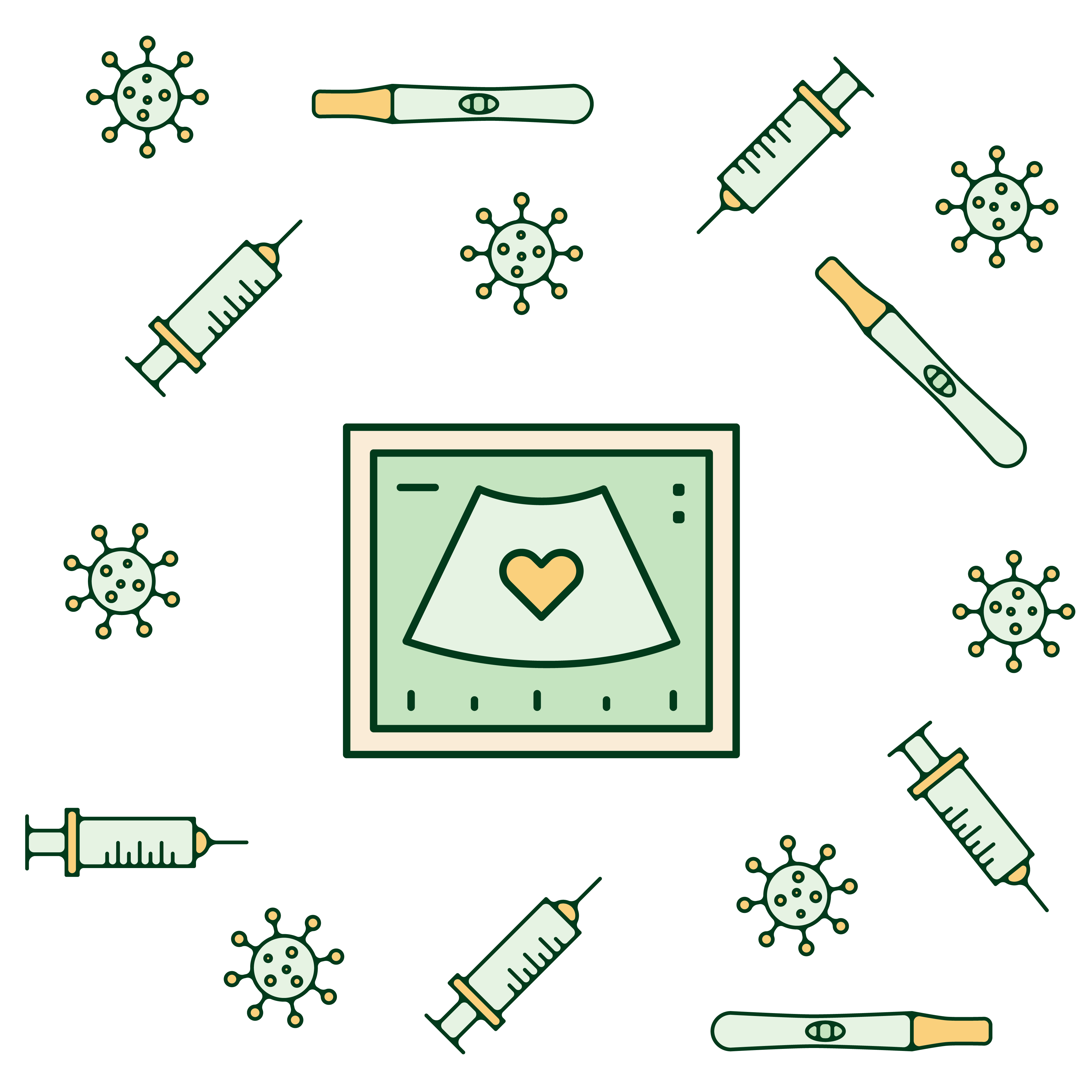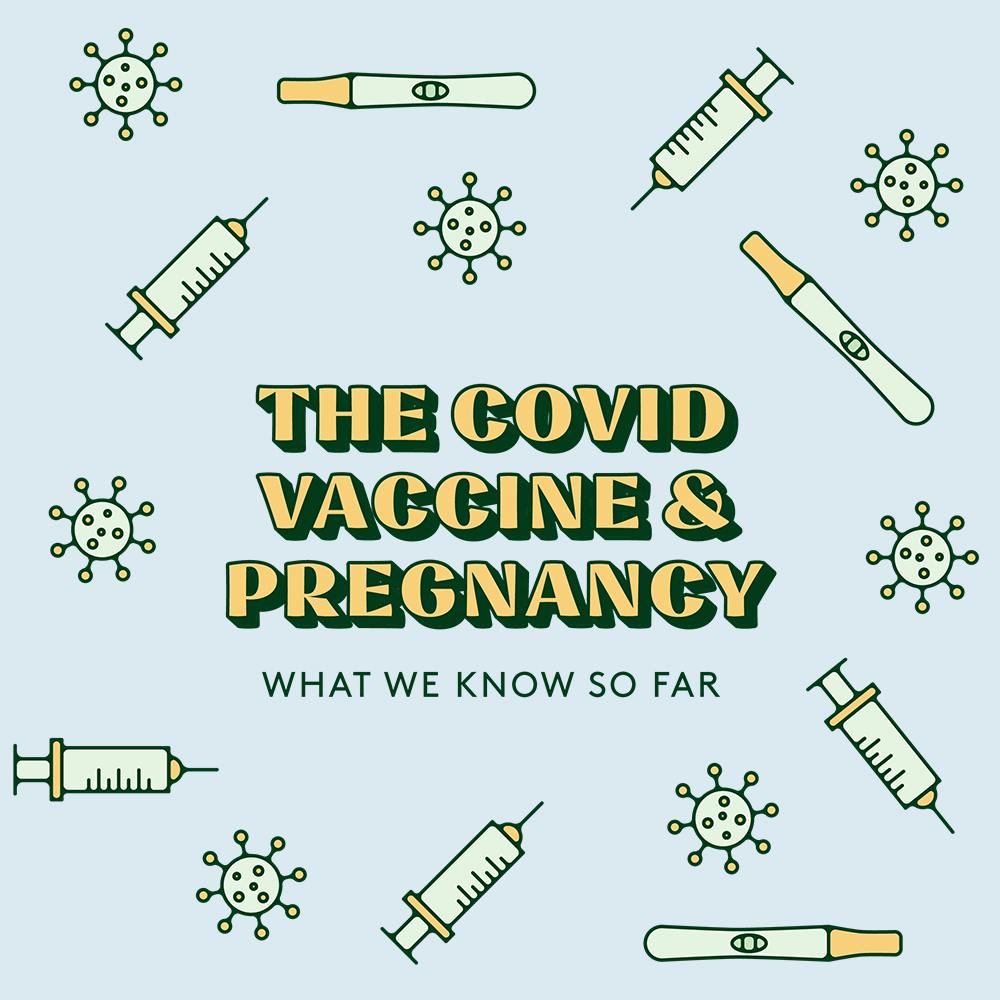Illustrated by Sabrina Bezerra
There is no evidence to suggest the COVID-19 vaccine causes infertility in women, or issues during pregnancy. So why are people so concerned about the vaccine’s safety?
The answer is a perfect storm of social media posts, misinformation and scaremongering, for the most part.
For ethical reasons, the COVID-19 vaccine trials were not conducted on knowingly pregnant participants, but on February 18th 2021, Pfizer and BioNTech announced they have launched clinical trials to study the safety and effectiveness of its COVID-19 vaccine on pregnant women. The study will enrol approximately 4,000 healthy pregnant women, who will be vaccinated during 24 to 34 weeks of gestation.
It’s absolutely valid to have questions about a new vaccine – especially if you’re trying to conceive or are already expecting – so we put together everything researchers know so far about the safety of the COVID-19 vaccine on pregnancy, breastfeeding and fertility.
Why were people concerned?
Last year, rumours circulated online that the head research developer at Pfizer-BioNTech (one of the vaccine manufacturers) had equated the COVID-19 vaccine “female sterilisation”. In reality, he left the company back in 2011 and didn’t even work in vaccine development when he was employed at Pfizer.
When the COVID-19 vaccine trials started getting media coverage, several social media posts falsely claimed that the protein formed by the mRNA vaccines blocked something called syncytin-1, a protein necessary for the formation of human placenta.
Syncytin-1 is critical as it allows the placenta to remain attached to the uterus, and acts as a source of blood supply and nutrition for a foetus during pregnancy. It shares similar amino acids to the COVID-19 spike protein, but it’s not similar enough for antibodies to confuse the two – so the vaccine will not hinder the production of syncytin-1.
Can the COVID-19 vaccine cause infertility?
“There is simply no evidence to suggest that COVID-19 vaccines will affect fertility and, furthermore, there is no biologically plausible mechanism by which current vaccines would cause any impact on women's fertility,” says Prof. Louise Kenny, Executive Pro Vice Chancellor of the Faculty of Health and Life Sciences at the University of Liverpool, and member of Daye’s clinical advisory board. “Women should be absolutely reassured on this point.”
During the vaccine trials, 23 Pfizer-BioNTech and 13 Moderna study participants became pregnant by accident. There was one pregnancy loss reported in the Pfizer-BioNTech study, but this was in a participant who received the placebo, suggesting the COVID-19 vaccine does not stop you from getting pregnant, nor does it cause any problems with the pregnancy.
In a recent statement, The Royal College of Obstetricians and Gynaecologists (RCOG) also stated that there is no indication that the vaccine could affect fertility: “We want to reassure women there is no evidence to suggest that COVID-19 vaccines will affect fertility.”
The RCOG added that any “claims of any effect of COVID-19 vaccination on fertility are speculative and not supported by any data. There is no biologically plausible mechanism by which current vaccines would cause any impact on women’s fertility. Evidence has not been presented that women who have been vaccinated have gone on to have fertility problems.”
Can pregnant women get the COVID-19 vaccine?

Yes, but only if they’re at high risk (for now). For ethical reasons, pregnant women weren’t included in the first round of trials, so at the time experts advised all pregnant women not to get the vaccine.
In 2021 that changed, and current guidance now says the vaccine should only be offered to pregnant women who are at high risk of catching COVID-19 (such as those on the frontline), or with underlying conditions that put them at high risk of serious complications if they catch the virus.
“Safety data from the vaccine studies do not indicate any safety concern or harm to pregnancy,” added Prof. Kenny. “However, at the current time we only recommend the use of COVID‐19 vaccines during pregnancy when the potential benefits outweigh the risks. Pregnant women at high risk of severe disease and healthcare workers should discuss the risks and benefits of COVID‐19 vaccine with their healthcare provider.”
The UK Medical and Healthcare products Regulatory Agency (MHRA) hasn’t raised any concerns over the vaccine’s safety, and the Joint Committee on Vaccination and Immunisation (JCVI) recognises the importance of pregnant women, who are at high risk, receiving the vaccination.
Meanwhile, the World Health Organization (WHO) has said about the Moderna vaccine: “based on what we know about this kind of vaccine, we don’t have any specific reason to believe there will be specific risks that would outweigh the benefits of vaccination for pregnant women.”
“For this reason, those pregnant women at high risk of exposure to SARS-CoV-2 (e.g. health workers) or who have comorbidities which add to their risk of severe disease, may be vaccinated in consultation with their health care provider.”
Guidance from Public Health England also states: “The early COVID-19 vaccines do not contain organisms that can multiply in the body, so they cannot infect an unborn baby in the womb.”
Can you receive COVID-19 vaccines while breastfeeding?
Research on the vaccine during breastfeeding is still young, so there’s no data on the safety of the COVID-19 vaccines in breastfeeding. However, nothing suggests the vaccine could put a breastfeeding infant at risk. Because of this, the JCVI has recommended that the vaccine can be received while breastfeeding.
If you’re currently breastfeeding and have been invited to receive the vaccine, you can speak to your healthcare provider if you’re concerned.






